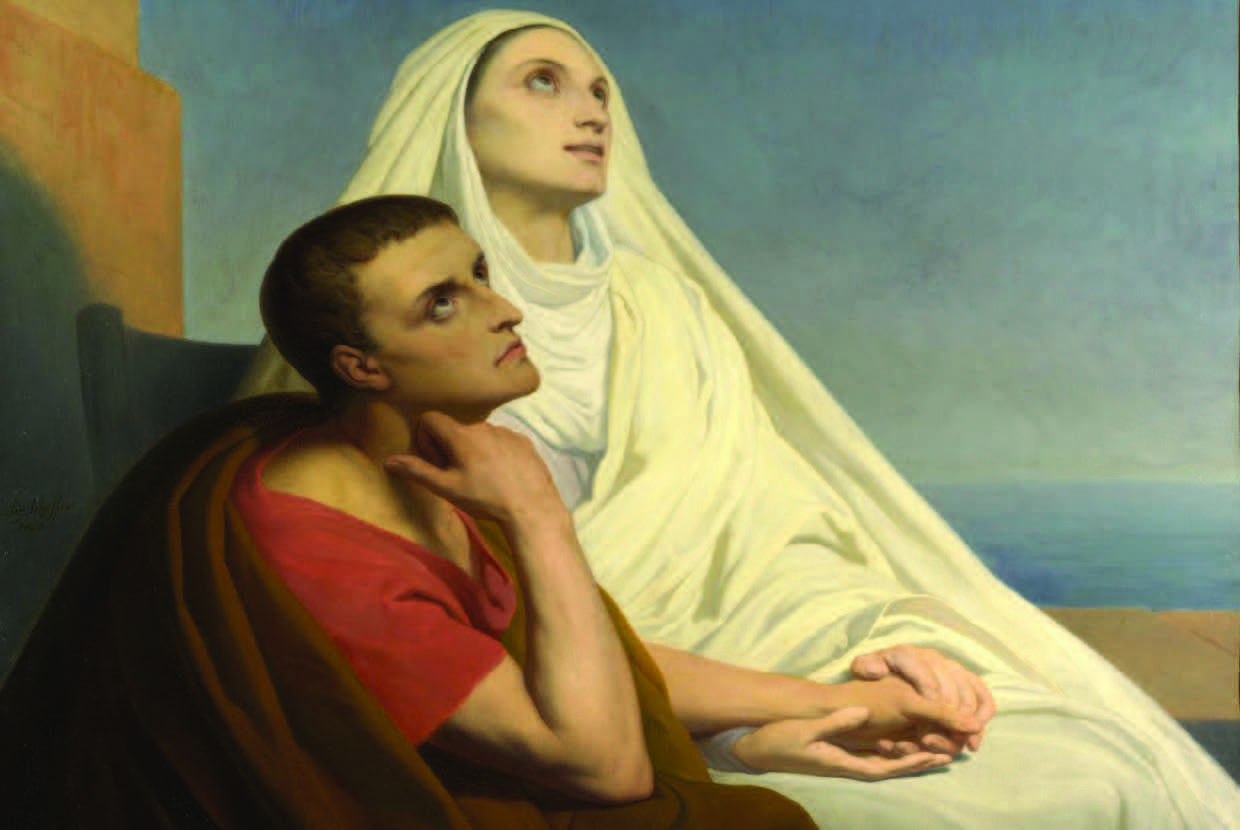On Aug. 27 and 28, the Church celebrates, respectively, the memorials of St. Monica and her son, Augustine, whose conversion is credited to his mother’s constant prayer and involvement in his life — at times much to her son’s chagrin.
Anyone who is praying for the conversion of a loved one would be inspired by Monica’s constancy, but it’s the “Confessions of St. Augustine” that has been lauded as a masterpiece. Although I read it decades ago, I reread it recently, and what impressed me in the past was different than what impressed me this time.
During the initial read I was interested in what Augustine disclosed about his life, but this time I was interested in what he shared about his relationship with God. Confounded by his discovery that despite his sinfulness, God never left him, the entire book is addressed to God, which has led some to regard it as a continual prayer.
In conversing with God, often in the form of rhetorical questions, the saint reveals his innermost thoughts. However, lest readers dismiss God’s love and mercy as a foregone conclusion, Augustine acknowledges his bewilderment regarding the humility of a God whom heaven and earth cannot contain, yet condescends to be contained within mortal human beings.
The confession of his sins was never the saint’s objective. His intent was to share the abundance and unknowable bounty of God’s love and mercy in response to the wayward and selfish tendencies of the human heart. It’s a theme that’s carried throughout the pages, which offers hope to all regardless of where they are on the journey.
Not everyone may be inclined to read the confessions of the man who eventually became a doctor of the Church, but most Christians are familiar with the words, “You have made us for yourself O God, and our heart is restless until it rests in you.” Ironically, since the words appear in the first paragraph of the book, the foreword could include a spoiler alert since the saint announces the conclusion of his search at the very beginning of the book.
The account, which resembles a journal more than an autobiography, offers insights into Augustine’s life as well as philosophical reflections on the growth and development of the human person from infancy to adulthood. Long before psychologists posited theories regarding human behavior, the fourth century saint ventured into the dilemma of humanity’s failure to choose what in their deepest center they know to be true.
Given the cultural proclivity to air the sins of others in public, Augustine’s honest self-appraisal and acknowledgement of his own sins is refreshing. Yet confession was not his only purpose.
More than declaring his sins, he wanted to understand the reason why he sinned. In what he referred to as “a zeal for wisdom,” Augustine invited God to accompany him as he revisited the sins and failings of his life. Recounting his continued failures, he wrote, “Suffering from a most fearful wound, I quaked in spirit…because I did not want to enter into a covenant with your will, O God.”
Sometimes we can be too dismissive of our wrong doings, using Embrace what St. Augustine learned about God he words of St. Paul, “I do not do the good I want, but the evil I do not want is what I do” (Rom 7:19) as an excuse for our failures.
Augustine took Paul’s acknowledgement a step further. He explained that we have two wills: one that’s complete and knows what is right and the other that’s incomplete and acts according to its pleasure rather than according to the will of God.
The question for each of us is which will do we honor? When we begin to understand that God is nearer to us than we are to ourselves, we, like St. Augustine, will proclaim:
“You were within me, but I was outside, and it was there that I searched for you. In my unloveliness I plunged into the lovely things which you created. You were with me, but I was not with you.
“Created things kept me from you; yet if they had not been in you, they would not have been at all. You called, you shouted, and you broke through my deafness. You flashed, you shone, and you dispelled my blindness.
“You breathed your fragrance on me; I drew in breath and now I pant for you. I have tasted you, now I hunger and thirst for more. You touched me, and I burned for your peace.”
That same Spirit is still at work, changing hearts. I was reminded of this the other day when I met with a woman who had returned to the Church after being away for 45 years. And her story is just as inspiring as Augustine’s.

